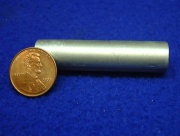Magnesium
Description
An alkaline earth metal that is one of the most common elements in the earth's crust at 2.1% by weight. Magnesium is found naturally in the following minerals: Magnesite, Carnallite, Dolomite, Epsomite, and kieserite. Magnesium salts are also dissolved in seawater. Magnesium was first isolated in metallic form by Sir Humphrey Davy in 1808. The lightweight silvery metal oxidizes slowly in moist air. Magnesium is used for the manufacture of lightweight metallic alloys, fireworks, flashbulbs, optical mirrors. Magnesium salts are used as heat-resistant and insulating materials and as fillers in paper, cements, ceramics, glass, and paint.
Synonyms and Related Terms
Mg; magnésium (Fr.); magnesio (It., Esp.); magnésio (Port.)
Risks
Skin contact can cause irritation. Inhalation can cause metal fume fever.
Flammable, dangerous fire hazard. Use dry sand to extinguish.
Fisher Scientific: SDS
Physical and Chemical Properties
Burns in oxygen to produce a brilliantly white light. Reacts with water and dilute acids
| Composition | Mg (atomic no. 12) |
|---|---|
| CAS | 7439-95-4 |
| Melting Point | 651 |
| Density | 1.738 |
| Molecular Weight | atomic wt = 24.305 |
| Boiling Point | 1100 |
Resources and Citations
- Web Elements: Website
- Richard S. Lewis, Hawley's Condensed Chemical Dictionary, Van Nostrand Reinhold, New York, 10th ed., 1993
- Van Nostrand's Scientific Encyclopedia, Douglas M. Considine (ed.), Van Nostrand Reinhold, New York, 1976
- Random House, Webster's Encyclopedic Unabridged Dictionary of the English Language, Grammercy Book, New York, 1997
- The Merck Index, Martha Windholz (ed.), Merck Research Labs, Rahway NJ, 10th edition, 1983 Comment: entry 5687
- The American Heritage Dictionary or Encarta, via Microsoft Bookshelf 98, Microsoft Corp., 1998
